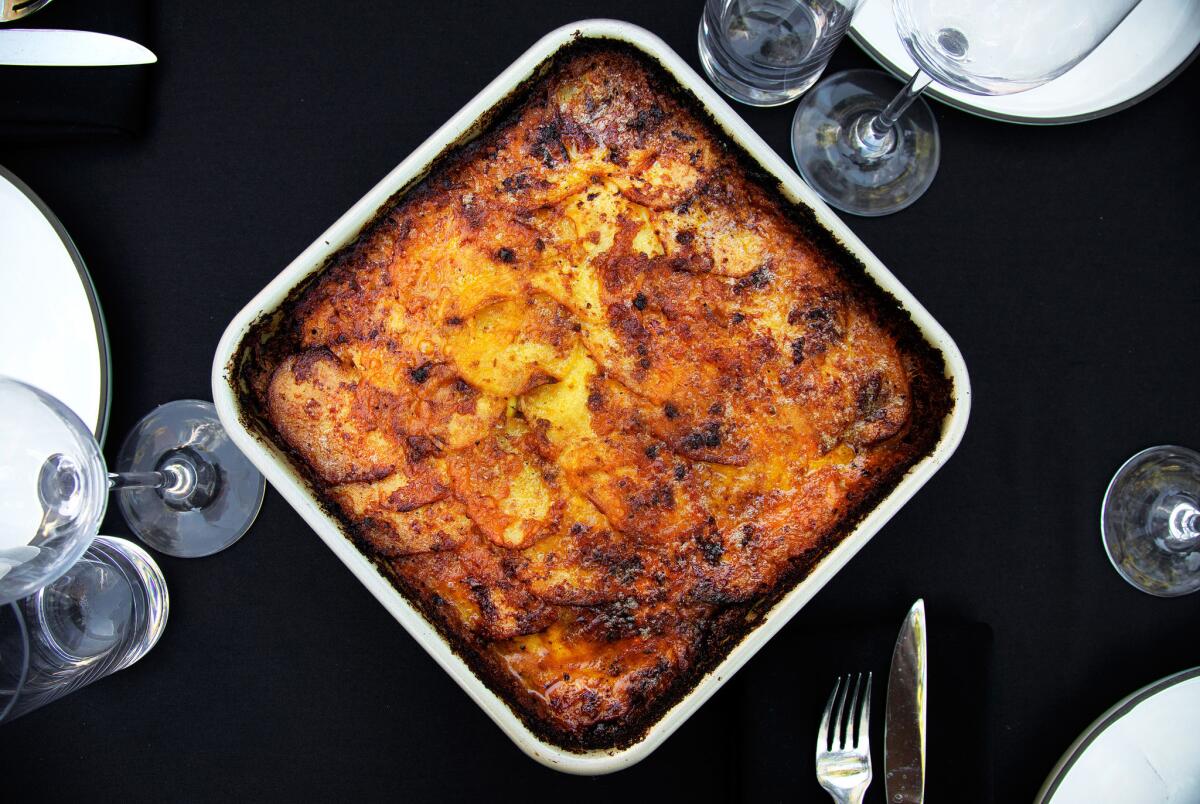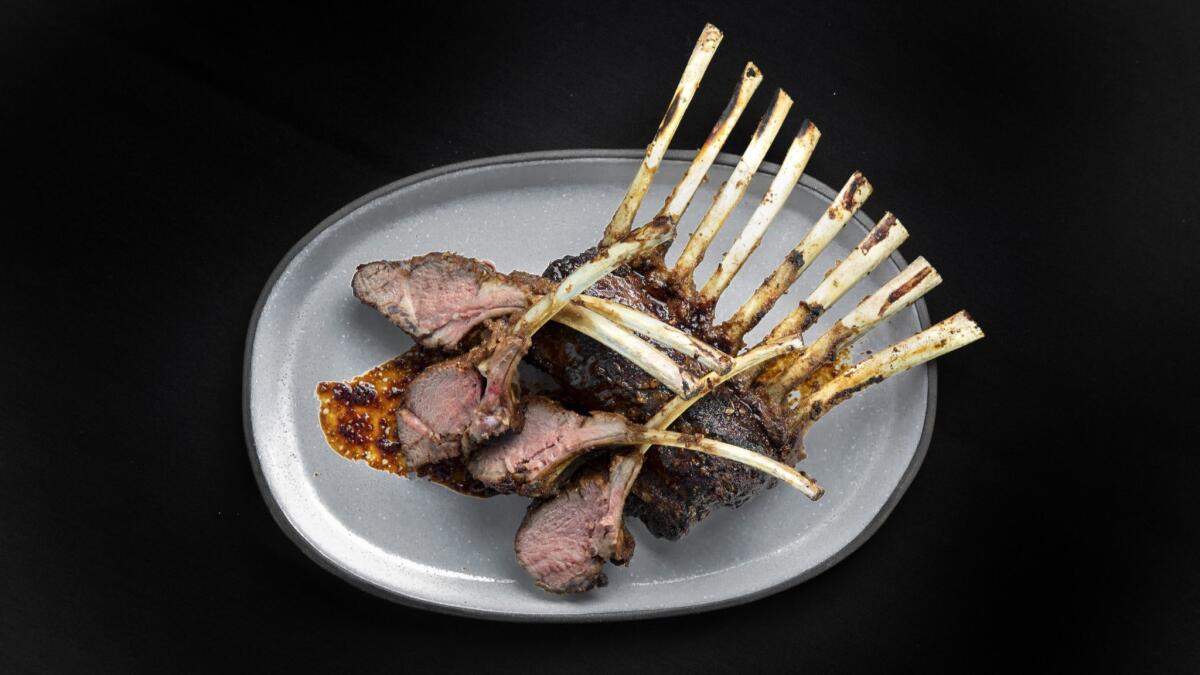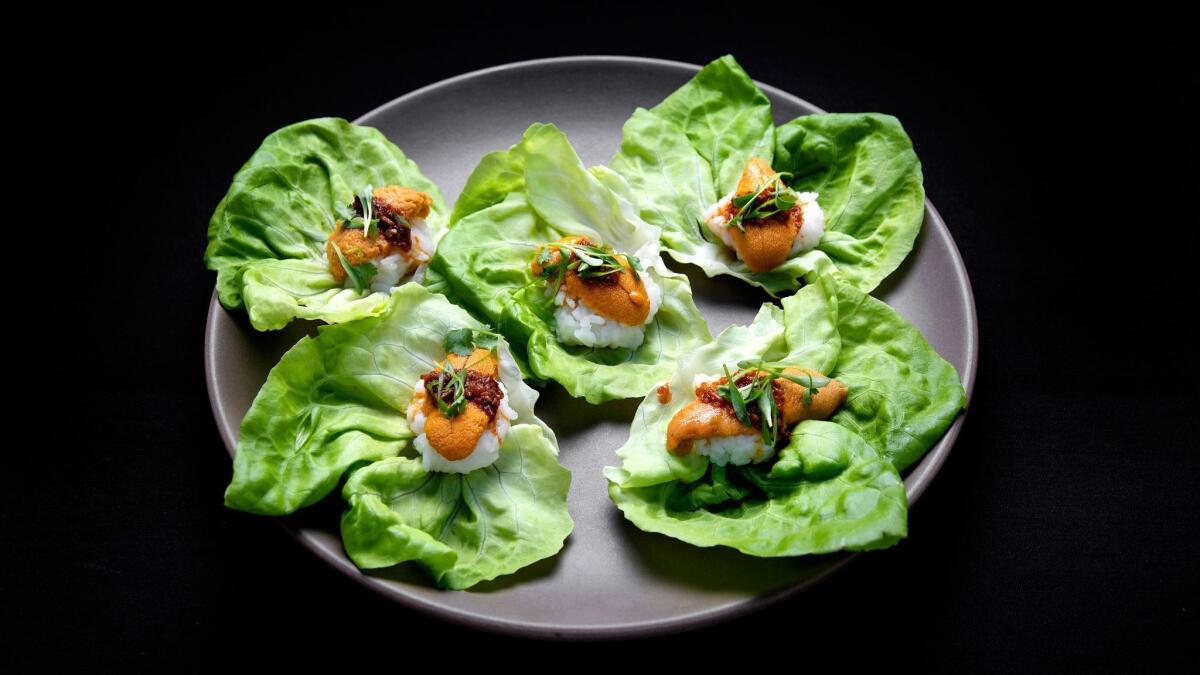I gave up on turkey at Thanksgiving and built an American melting-pot meal instead

- Share via
The phone starts buzzing. It’s 6 a.m. Who is texting this early?
The message reads: “12-pound bird. What temp? Stuffing in or out?” It is Thanksgiving, I realize.
For the next several hours, my phone turns in to the de facto Butterball Hotline for every panicked friend and family member in my life. I’m sure it’s the same for most chefs: the barrage of predictable questions, and the feeling that no matter how good the advice I give, people will still do what they’ve always done at Thanksgiving and be mildly disappointed with the results.
As an immigrant kid growing up in L.A., all I ever wanted was to fit in and be American. I liked Korean food, loved it, ate it, but when Thanksgiving came around, I demanded we partake in the cultural tradition of the “authentic” American Thanksgiving, so my family made it all: turkey, stuffing, sweet potatoes. I don’t know that any of us liked it, but it felt the right thing to do.
The centerpiece of any proper Thanksgiving is that burnished magazine cover turkey. And yet I’ve never encountered an ingredient so vexing to so many as that benign bird. Turkey is actually quite difficult to cook properly. It takes a bit of finesse. I know, I’ve tried.
As a chef, I began experimenting with turkey techniques, trying to cook my way around the bird’s shortcomings and challenges: its dryness, its blandness and that skin that never quite crisps the way a chicken’s can (unless you cook it separately from the whole animal, though that’s another conversation completely). I tried different types and methods of brining; I air-dried the bird à la Peking duck; I tried to luxurify it, stuffing white truffle shavings under the skin. No matter what I did, the results were still pretty boring. It was still just turkey.
“As an immigrant kid growing up in L.A., all I ever wanted was to fit in and be American.”
I know it’s part of a deeply rooted American holiday tradition, but eventually, I had to face the fact: It isn’t worth it. Most people tell me that they don’t even like turkey but that they like the traditional side dishes or the way gravy can right the inherent wrongs of the animal’s physiognomy.
Sometime in the late ’90s, when I was the chef of Michael’s in Santa Monica, a Thanksgiving rolled around and my parents were back in Korea. There was no pressure to do the pretending-to-be-good-Americans thing. So I decided I would have a Friendsgiving at my house, and for the first time in my life, I didn’t serve turkey. In fact, I was done trying to be traditional. I was taking this holiday overboard, no jumbo bird or stuffing or even marshmallow-covered sweet potatoes in sight.
Still want turkey? Make your Thanksgiving meal on sheet pans »
Here’s my thinking: If you’re going to spend weeks planning and all day in the kitchen, why cook something staid? Here’s what I do love about Thanksgiving: the idea of gathering friends around a table for a holiday that is almost expressly about the act of eating together. Why not push it all the way?
Of course, being a chef, I rarely cooked at home, let alone had people over. So if I was going to do this, I wanted it to be special. I decided I would serve prime rib — chefs, almost to a one, know that a properly cooked prime rib is about as good as meat gets. So I had my meat guy dry-age a rack of prime rib for me.

Recipe: Triple cheese curried cauliflower gratin »
I wanted the meal to kick off with ostentatious luxury that made it clear this wasn’t Thanksgiving at your boring aunt’s house: We would down oysters and lots of caviar. My preferred oyster preparation is called Oysters à la Russe, a canapé allegedly served on the Titanic the night it went down; I figured it was fitting to roll this out on the night I was sending old-school Thanksgiving to its watery grave. I added caviar to my version. Why not?
Traditional sides wouldn’t cut it. Stuffing is for turkeys, literally and figuratively. Instead, I made a savory bread pudding using cornbread, bacon and Swiss chard. For potatoes, I opted for pomme dauphinois, a labor-intensive southern French classic of paper-thin sliced potatoes layered with Gruyère cheese, cream and garlic. (You can also add Parmesan, and Cantal cheese if you can find it; these days, my potatoes also include cauliflower and are spiked with vadouvan, a kind of French curry powder-ish spice blend that you should definitely find for your cupboard.)
“Here’s what I do love about Thanksgiving: the idea of gathering friends around a table”
When the oysters and caviar didn’t feel opulent enough, I started doing versions of uni ssam. Basically a cross between nigiri sushi and lettuce cups using fresh Santa Barbara sea urchin, the dish involves sushi rice that has been lightly crisped and a savory-spicy fermented bean paste such as Chinese doubanjiang or Korean ssamjang to offer a funky contrast to the sweet flavor of perfect urchin.
This year, after pushing prime rib as far as I could, I am switching to racks of lamb, taking on a new challenge, taking the holiday a new way. I’ve been tinkering with Sichuan flavors for many years now at my restaurant Lukshon in Culver City and I’m obsessed with how cumin is used with lamb in Sichuan cooking. So I’ve come up with a cumin-driven spice blend that really plays well with the gaminess of lamb. I really like the Asian tradition of serving rice toward the end of the meal. A big guest favorite these last few years has been congee made with king crab dashi and king crab meat and finished with a little cultured butter, à la risotto. Then covered in shaved fresh white truffle.

What do we drink? Champagne and only Champagne: No one needs to bring anything to Sangsgiving. I raid my cellar — I have been a Champagne fanatic for years — and we start with bracingly tart blanc de blancs and then descend into pinot noir-driven rosés.
What my friends and I know as Sangsgiving is today an intentional feast of excess. In its nearly two decades, it has become an invitation my friends jockey for with little success. No more than a dozen are invited. There are no plus-ones; seriously — I once ordered an Uber for a friend’s out-of-town buddy who showed up uninvited.

Recipe: Spicy uni lardo sushi lettuce cups »
Thanksgiving when I was a kid was about fitting in, about being as American as I could be, about recipes off boxes and cans and not even a little kimchi to make things taste better. My way of thinking about the holiday now is that bird or no bird, we gather, we eat, we give thanks. Sangsgiving is a perversity of sorts, but I like to think of it as a melting pot meal that represents everything I have learned and eaten and experienced here, served up as a special evening for my friends. It is as American as anything.
Eat your way across L.A.
Get our weekly Tasting Notes newsletter for reviews, news and more.
You may occasionally receive promotional content from the Los Angeles Times.







